BA Business Management: Budgeting's Role in Managerial Decision-Making
VerifiedAdded on 2023/01/09
|8
|1887
|48
Essay
AI Summary
This essay delves into the critical role of budgeting in management accounting, highlighting its significance in managerial decision-making. The introduction defines management accounting and sets the stage for exploring how budgeting aids in forecasting, controlling expenses, and strategic planning. The main body of the essay examines various budgeting types, including static and flexible budgets, evaluating their advantages and disadvantages and their suitability based on organizational needs. The essay further explores the impact of dynamic changes in the business environment on budgeting styles, such as incremental, activity-based, value proposition, and zero-based budgeting. Participative budgeting is also discussed, analyzing its merits and demerits. The conclusion summarizes the importance of budgeting tools in enabling organizations to forecast needs and make informed decisions in a constantly evolving environment, drawing upon the provided references for support.

Essay
Paraphrase This Document
Need a fresh take? Get an instant paraphrase of this document with our AI Paraphraser
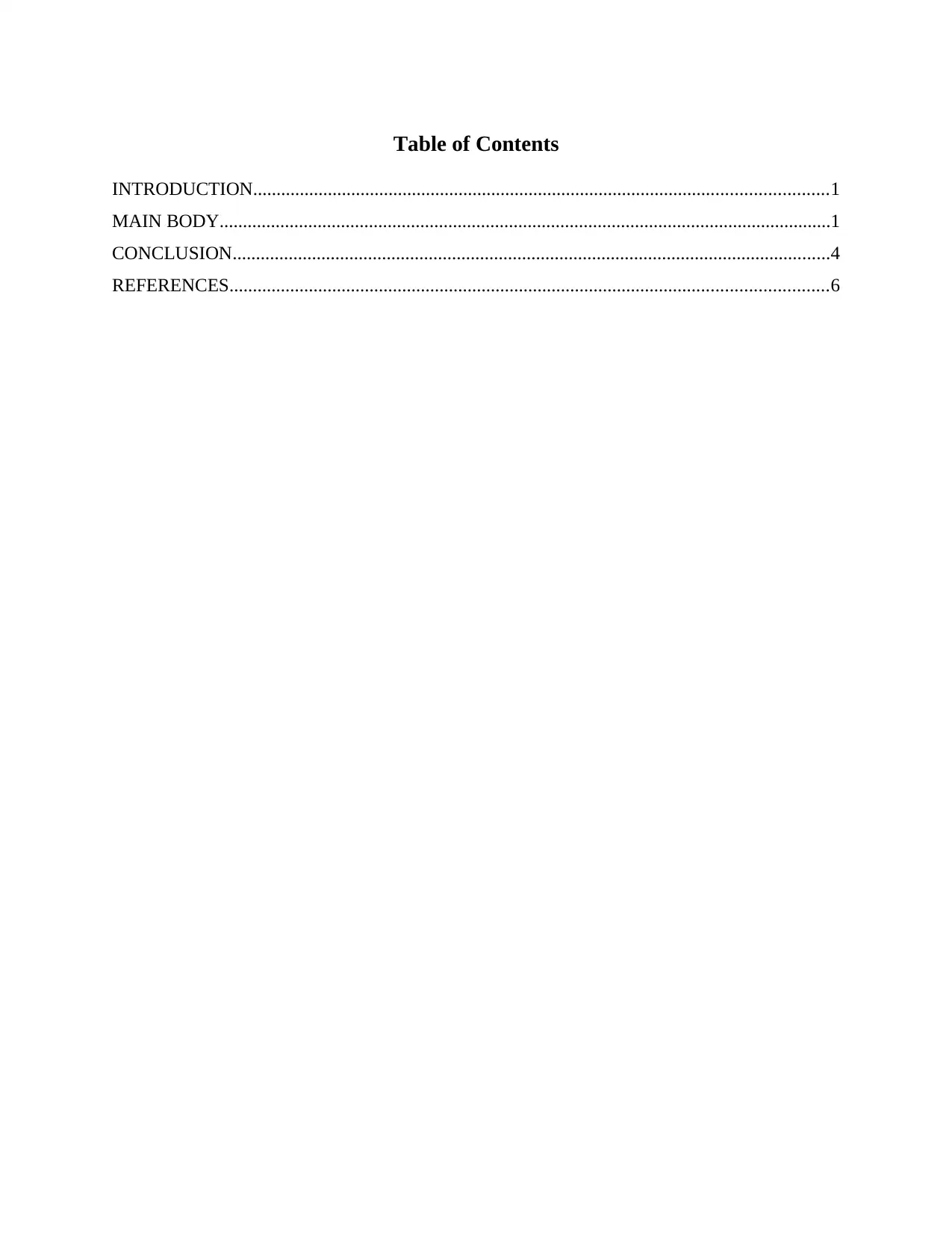
Table of Contents
INTRODUCTION...........................................................................................................................1
MAIN BODY...................................................................................................................................1
CONCLUSION................................................................................................................................4
REFERENCES................................................................................................................................6
INTRODUCTION...........................................................................................................................1
MAIN BODY...................................................................................................................................1
CONCLUSION................................................................................................................................4
REFERENCES................................................................................................................................6
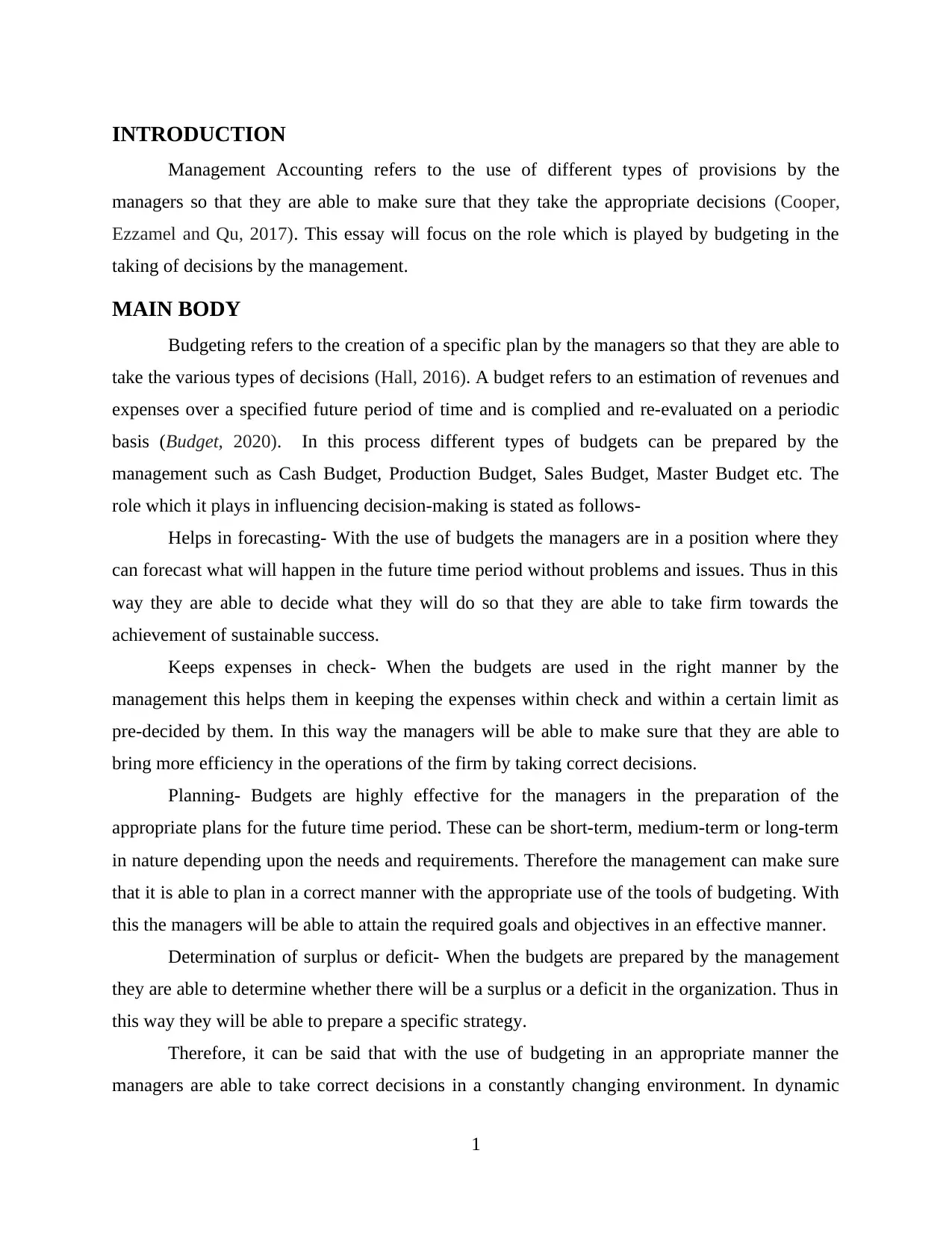
INTRODUCTION
Management Accounting refers to the use of different types of provisions by the
managers so that they are able to make sure that they take the appropriate decisions (Cooper,
Ezzamel and Qu, 2017). This essay will focus on the role which is played by budgeting in the
taking of decisions by the management.
MAIN BODY
Budgeting refers to the creation of a specific plan by the managers so that they are able to
take the various types of decisions (Hall, 2016). A budget refers to an estimation of revenues and
expenses over a specified future period of time and is complied and re-evaluated on a periodic
basis (Budget, 2020). In this process different types of budgets can be prepared by the
management such as Cash Budget, Production Budget, Sales Budget, Master Budget etc. The
role which it plays in influencing decision-making is stated as follows-
Helps in forecasting- With the use of budgets the managers are in a position where they
can forecast what will happen in the future time period without problems and issues. Thus in this
way they are able to decide what they will do so that they are able to take firm towards the
achievement of sustainable success.
Keeps expenses in check- When the budgets are used in the right manner by the
management this helps them in keeping the expenses within check and within a certain limit as
pre-decided by them. In this way the managers will be able to make sure that they are able to
bring more efficiency in the operations of the firm by taking correct decisions.
Planning- Budgets are highly effective for the managers in the preparation of the
appropriate plans for the future time period. These can be short-term, medium-term or long-term
in nature depending upon the needs and requirements. Therefore the management can make sure
that it is able to plan in a correct manner with the appropriate use of the tools of budgeting. With
this the managers will be able to attain the required goals and objectives in an effective manner.
Determination of surplus or deficit- When the budgets are prepared by the management
they are able to determine whether there will be a surplus or a deficit in the organization. Thus in
this way they will be able to prepare a specific strategy.
Therefore, it can be said that with the use of budgeting in an appropriate manner the
managers are able to take correct decisions in a constantly changing environment. In dynamic
1
Management Accounting refers to the use of different types of provisions by the
managers so that they are able to make sure that they take the appropriate decisions (Cooper,
Ezzamel and Qu, 2017). This essay will focus on the role which is played by budgeting in the
taking of decisions by the management.
MAIN BODY
Budgeting refers to the creation of a specific plan by the managers so that they are able to
take the various types of decisions (Hall, 2016). A budget refers to an estimation of revenues and
expenses over a specified future period of time and is complied and re-evaluated on a periodic
basis (Budget, 2020). In this process different types of budgets can be prepared by the
management such as Cash Budget, Production Budget, Sales Budget, Master Budget etc. The
role which it plays in influencing decision-making is stated as follows-
Helps in forecasting- With the use of budgets the managers are in a position where they
can forecast what will happen in the future time period without problems and issues. Thus in this
way they are able to decide what they will do so that they are able to take firm towards the
achievement of sustainable success.
Keeps expenses in check- When the budgets are used in the right manner by the
management this helps them in keeping the expenses within check and within a certain limit as
pre-decided by them. In this way the managers will be able to make sure that they are able to
bring more efficiency in the operations of the firm by taking correct decisions.
Planning- Budgets are highly effective for the managers in the preparation of the
appropriate plans for the future time period. These can be short-term, medium-term or long-term
in nature depending upon the needs and requirements. Therefore the management can make sure
that it is able to plan in a correct manner with the appropriate use of the tools of budgeting. With
this the managers will be able to attain the required goals and objectives in an effective manner.
Determination of surplus or deficit- When the budgets are prepared by the management
they are able to determine whether there will be a surplus or a deficit in the organization. Thus in
this way they will be able to prepare a specific strategy.
Therefore, it can be said that with the use of budgeting in an appropriate manner the
managers are able to take correct decisions in a constantly changing environment. In dynamic
1
⊘ This is a preview!⊘
Do you want full access?
Subscribe today to unlock all pages.

Trusted by 1+ million students worldwide
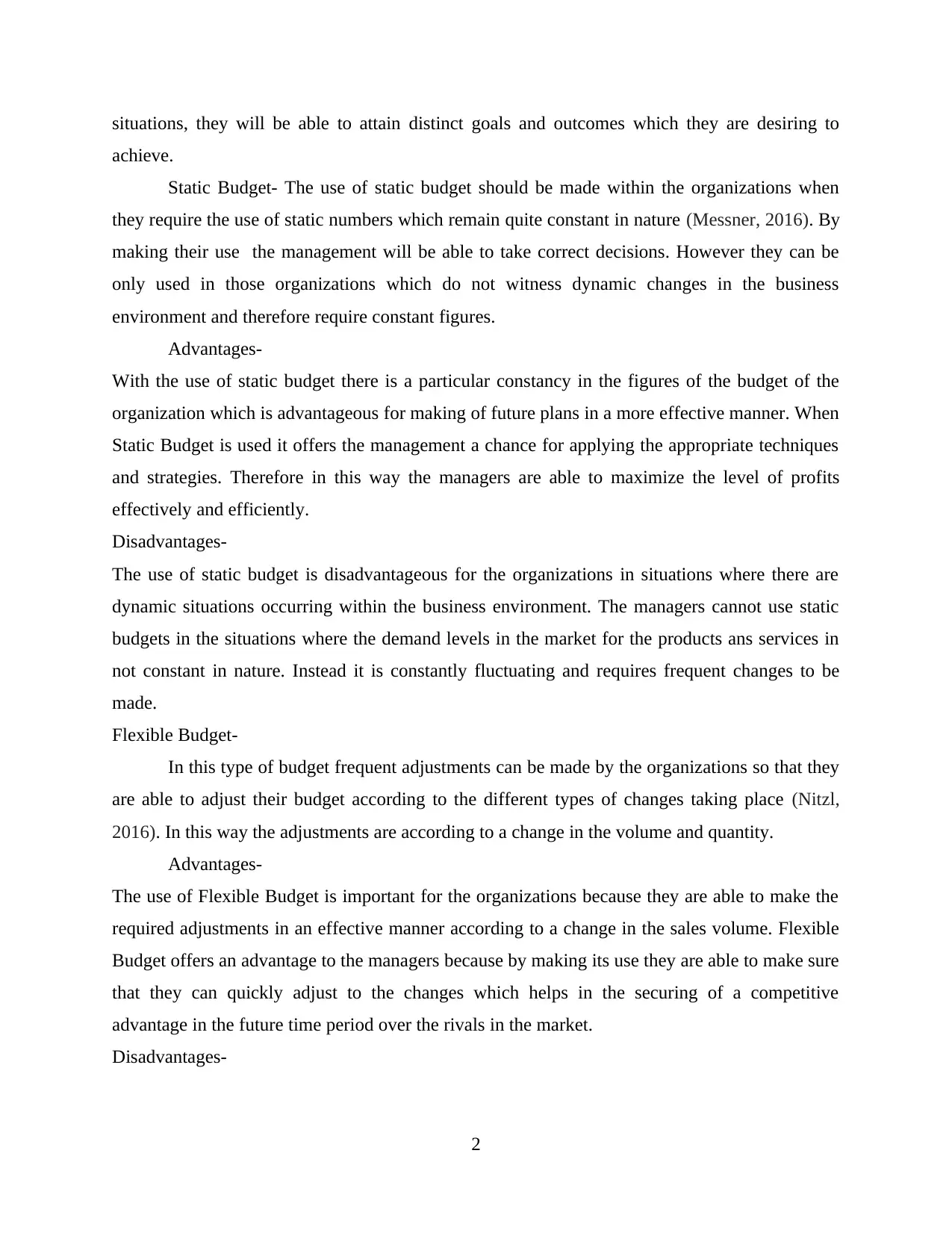
situations, they will be able to attain distinct goals and outcomes which they are desiring to
achieve.
Static Budget- The use of static budget should be made within the organizations when
they require the use of static numbers which remain quite constant in nature (Messner, 2016). By
making their use the management will be able to take correct decisions. However they can be
only used in those organizations which do not witness dynamic changes in the business
environment and therefore require constant figures.
Advantages-
With the use of static budget there is a particular constancy in the figures of the budget of the
organization which is advantageous for making of future plans in a more effective manner. When
Static Budget is used it offers the management a chance for applying the appropriate techniques
and strategies. Therefore in this way the managers are able to maximize the level of profits
effectively and efficiently.
Disadvantages-
The use of static budget is disadvantageous for the organizations in situations where there are
dynamic situations occurring within the business environment. The managers cannot use static
budgets in the situations where the demand levels in the market for the products ans services in
not constant in nature. Instead it is constantly fluctuating and requires frequent changes to be
made.
Flexible Budget-
In this type of budget frequent adjustments can be made by the organizations so that they
are able to adjust their budget according to the different types of changes taking place (Nitzl,
2016). In this way the adjustments are according to a change in the volume and quantity.
Advantages-
The use of Flexible Budget is important for the organizations because they are able to make the
required adjustments in an effective manner according to a change in the sales volume. Flexible
Budget offers an advantage to the managers because by making its use they are able to make sure
that they can quickly adjust to the changes which helps in the securing of a competitive
advantage in the future time period over the rivals in the market.
Disadvantages-
2
achieve.
Static Budget- The use of static budget should be made within the organizations when
they require the use of static numbers which remain quite constant in nature (Messner, 2016). By
making their use the management will be able to take correct decisions. However they can be
only used in those organizations which do not witness dynamic changes in the business
environment and therefore require constant figures.
Advantages-
With the use of static budget there is a particular constancy in the figures of the budget of the
organization which is advantageous for making of future plans in a more effective manner. When
Static Budget is used it offers the management a chance for applying the appropriate techniques
and strategies. Therefore in this way the managers are able to maximize the level of profits
effectively and efficiently.
Disadvantages-
The use of static budget is disadvantageous for the organizations in situations where there are
dynamic situations occurring within the business environment. The managers cannot use static
budgets in the situations where the demand levels in the market for the products ans services in
not constant in nature. Instead it is constantly fluctuating and requires frequent changes to be
made.
Flexible Budget-
In this type of budget frequent adjustments can be made by the organizations so that they
are able to adjust their budget according to the different types of changes taking place (Nitzl,
2016). In this way the adjustments are according to a change in the volume and quantity.
Advantages-
The use of Flexible Budget is important for the organizations because they are able to make the
required adjustments in an effective manner according to a change in the sales volume. Flexible
Budget offers an advantage to the managers because by making its use they are able to make sure
that they can quickly adjust to the changes which helps in the securing of a competitive
advantage in the future time period over the rivals in the market.
Disadvantages-
2
Paraphrase This Document
Need a fresh take? Get an instant paraphrase of this document with our AI Paraphraser
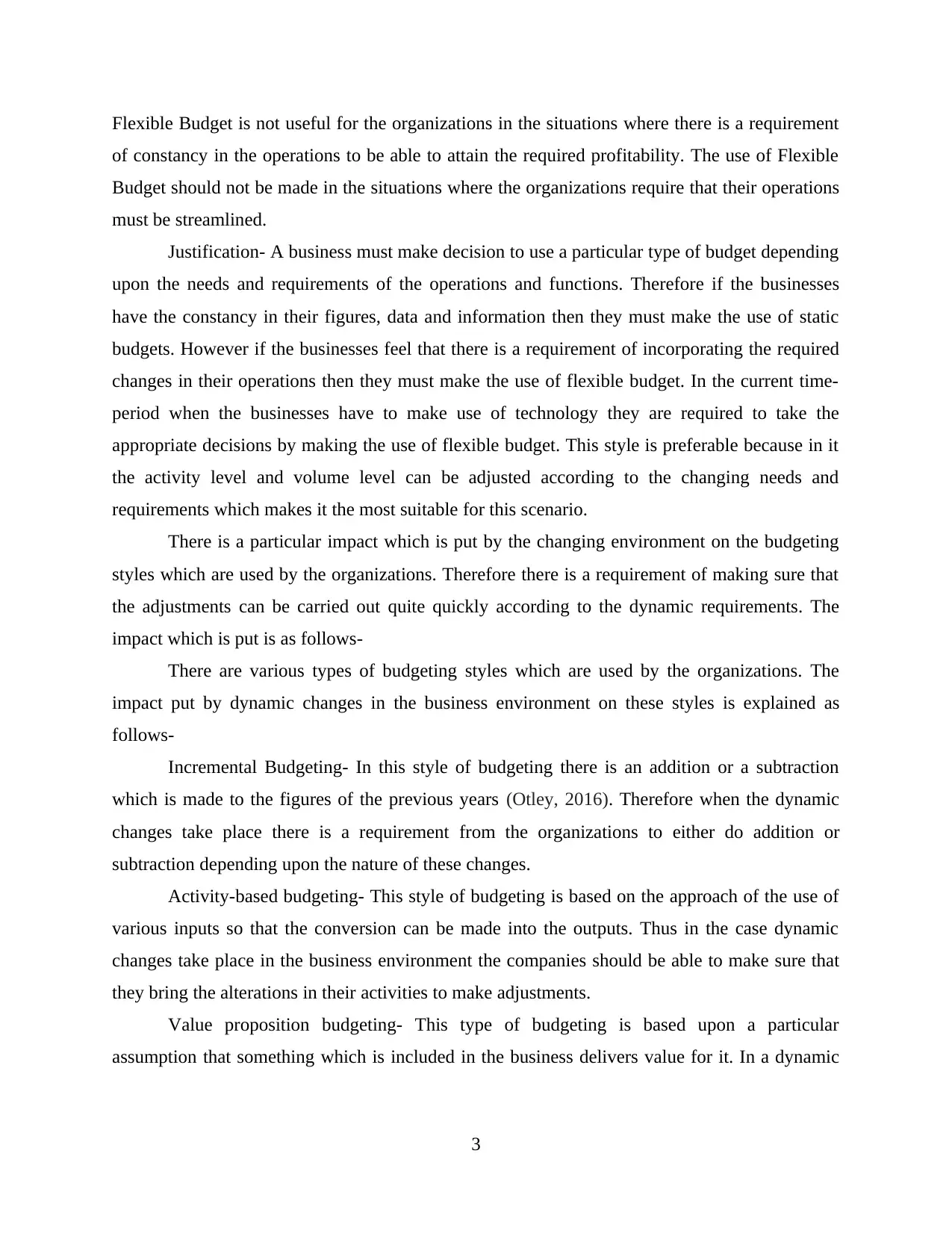
Flexible Budget is not useful for the organizations in the situations where there is a requirement
of constancy in the operations to be able to attain the required profitability. The use of Flexible
Budget should not be made in the situations where the organizations require that their operations
must be streamlined.
Justification- A business must make decision to use a particular type of budget depending
upon the needs and requirements of the operations and functions. Therefore if the businesses
have the constancy in their figures, data and information then they must make the use of static
budgets. However if the businesses feel that there is a requirement of incorporating the required
changes in their operations then they must make the use of flexible budget. In the current time-
period when the businesses have to make use of technology they are required to take the
appropriate decisions by making the use of flexible budget. This style is preferable because in it
the activity level and volume level can be adjusted according to the changing needs and
requirements which makes it the most suitable for this scenario.
There is a particular impact which is put by the changing environment on the budgeting
styles which are used by the organizations. Therefore there is a requirement of making sure that
the adjustments can be carried out quite quickly according to the dynamic requirements. The
impact which is put is as follows-
There are various types of budgeting styles which are used by the organizations. The
impact put by dynamic changes in the business environment on these styles is explained as
follows-
Incremental Budgeting- In this style of budgeting there is an addition or a subtraction
which is made to the figures of the previous years (Otley, 2016). Therefore when the dynamic
changes take place there is a requirement from the organizations to either do addition or
subtraction depending upon the nature of these changes.
Activity-based budgeting- This style of budgeting is based on the approach of the use of
various inputs so that the conversion can be made into the outputs. Thus in the case dynamic
changes take place in the business environment the companies should be able to make sure that
they bring the alterations in their activities to make adjustments.
Value proposition budgeting- This type of budgeting is based upon a particular
assumption that something which is included in the business delivers value for it. In a dynamic
3
of constancy in the operations to be able to attain the required profitability. The use of Flexible
Budget should not be made in the situations where the organizations require that their operations
must be streamlined.
Justification- A business must make decision to use a particular type of budget depending
upon the needs and requirements of the operations and functions. Therefore if the businesses
have the constancy in their figures, data and information then they must make the use of static
budgets. However if the businesses feel that there is a requirement of incorporating the required
changes in their operations then they must make the use of flexible budget. In the current time-
period when the businesses have to make use of technology they are required to take the
appropriate decisions by making the use of flexible budget. This style is preferable because in it
the activity level and volume level can be adjusted according to the changing needs and
requirements which makes it the most suitable for this scenario.
There is a particular impact which is put by the changing environment on the budgeting
styles which are used by the organizations. Therefore there is a requirement of making sure that
the adjustments can be carried out quite quickly according to the dynamic requirements. The
impact which is put is as follows-
There are various types of budgeting styles which are used by the organizations. The
impact put by dynamic changes in the business environment on these styles is explained as
follows-
Incremental Budgeting- In this style of budgeting there is an addition or a subtraction
which is made to the figures of the previous years (Otley, 2016). Therefore when the dynamic
changes take place there is a requirement from the organizations to either do addition or
subtraction depending upon the nature of these changes.
Activity-based budgeting- This style of budgeting is based on the approach of the use of
various inputs so that the conversion can be made into the outputs. Thus in the case dynamic
changes take place in the business environment the companies should be able to make sure that
they bring the alterations in their activities to make adjustments.
Value proposition budgeting- This type of budgeting is based upon a particular
assumption that something which is included in the business delivers value for it. In a dynamic
3
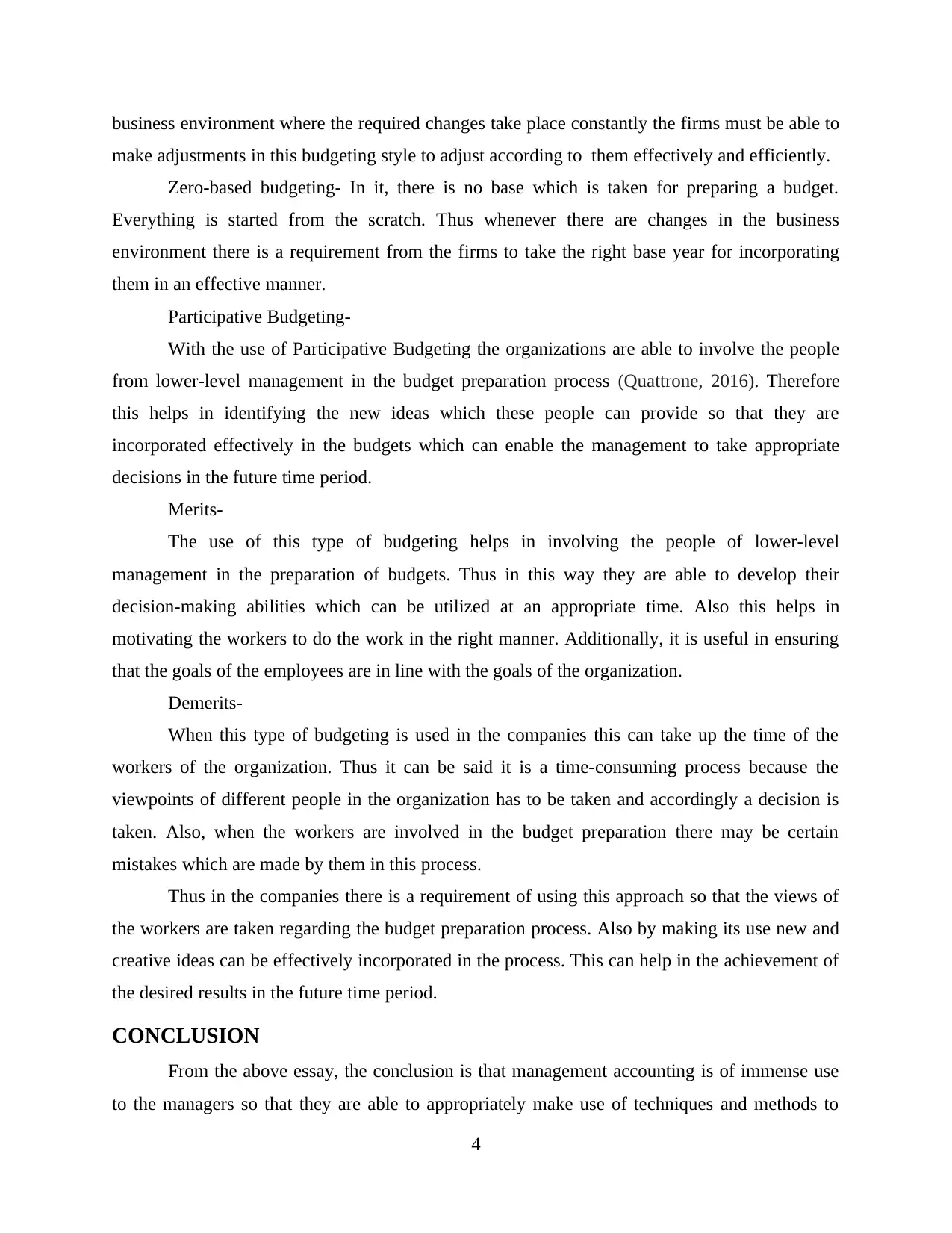
business environment where the required changes take place constantly the firms must be able to
make adjustments in this budgeting style to adjust according to them effectively and efficiently.
Zero-based budgeting- In it, there is no base which is taken for preparing a budget.
Everything is started from the scratch. Thus whenever there are changes in the business
environment there is a requirement from the firms to take the right base year for incorporating
them in an effective manner.
Participative Budgeting-
With the use of Participative Budgeting the organizations are able to involve the people
from lower-level management in the budget preparation process (Quattrone, 2016). Therefore
this helps in identifying the new ideas which these people can provide so that they are
incorporated effectively in the budgets which can enable the management to take appropriate
decisions in the future time period.
Merits-
The use of this type of budgeting helps in involving the people of lower-level
management in the preparation of budgets. Thus in this way they are able to develop their
decision-making abilities which can be utilized at an appropriate time. Also this helps in
motivating the workers to do the work in the right manner. Additionally, it is useful in ensuring
that the goals of the employees are in line with the goals of the organization.
Demerits-
When this type of budgeting is used in the companies this can take up the time of the
workers of the organization. Thus it can be said it is a time-consuming process because the
viewpoints of different people in the organization has to be taken and accordingly a decision is
taken. Also, when the workers are involved in the budget preparation there may be certain
mistakes which are made by them in this process.
Thus in the companies there is a requirement of using this approach so that the views of
the workers are taken regarding the budget preparation process. Also by making its use new and
creative ideas can be effectively incorporated in the process. This can help in the achievement of
the desired results in the future time period.
CONCLUSION
From the above essay, the conclusion is that management accounting is of immense use
to the managers so that they are able to appropriately make use of techniques and methods to
4
make adjustments in this budgeting style to adjust according to them effectively and efficiently.
Zero-based budgeting- In it, there is no base which is taken for preparing a budget.
Everything is started from the scratch. Thus whenever there are changes in the business
environment there is a requirement from the firms to take the right base year for incorporating
them in an effective manner.
Participative Budgeting-
With the use of Participative Budgeting the organizations are able to involve the people
from lower-level management in the budget preparation process (Quattrone, 2016). Therefore
this helps in identifying the new ideas which these people can provide so that they are
incorporated effectively in the budgets which can enable the management to take appropriate
decisions in the future time period.
Merits-
The use of this type of budgeting helps in involving the people of lower-level
management in the preparation of budgets. Thus in this way they are able to develop their
decision-making abilities which can be utilized at an appropriate time. Also this helps in
motivating the workers to do the work in the right manner. Additionally, it is useful in ensuring
that the goals of the employees are in line with the goals of the organization.
Demerits-
When this type of budgeting is used in the companies this can take up the time of the
workers of the organization. Thus it can be said it is a time-consuming process because the
viewpoints of different people in the organization has to be taken and accordingly a decision is
taken. Also, when the workers are involved in the budget preparation there may be certain
mistakes which are made by them in this process.
Thus in the companies there is a requirement of using this approach so that the views of
the workers are taken regarding the budget preparation process. Also by making its use new and
creative ideas can be effectively incorporated in the process. This can help in the achievement of
the desired results in the future time period.
CONCLUSION
From the above essay, the conclusion is that management accounting is of immense use
to the managers so that they are able to appropriately make use of techniques and methods to
4
⊘ This is a preview!⊘
Do you want full access?
Subscribe today to unlock all pages.

Trusted by 1+ million students worldwide
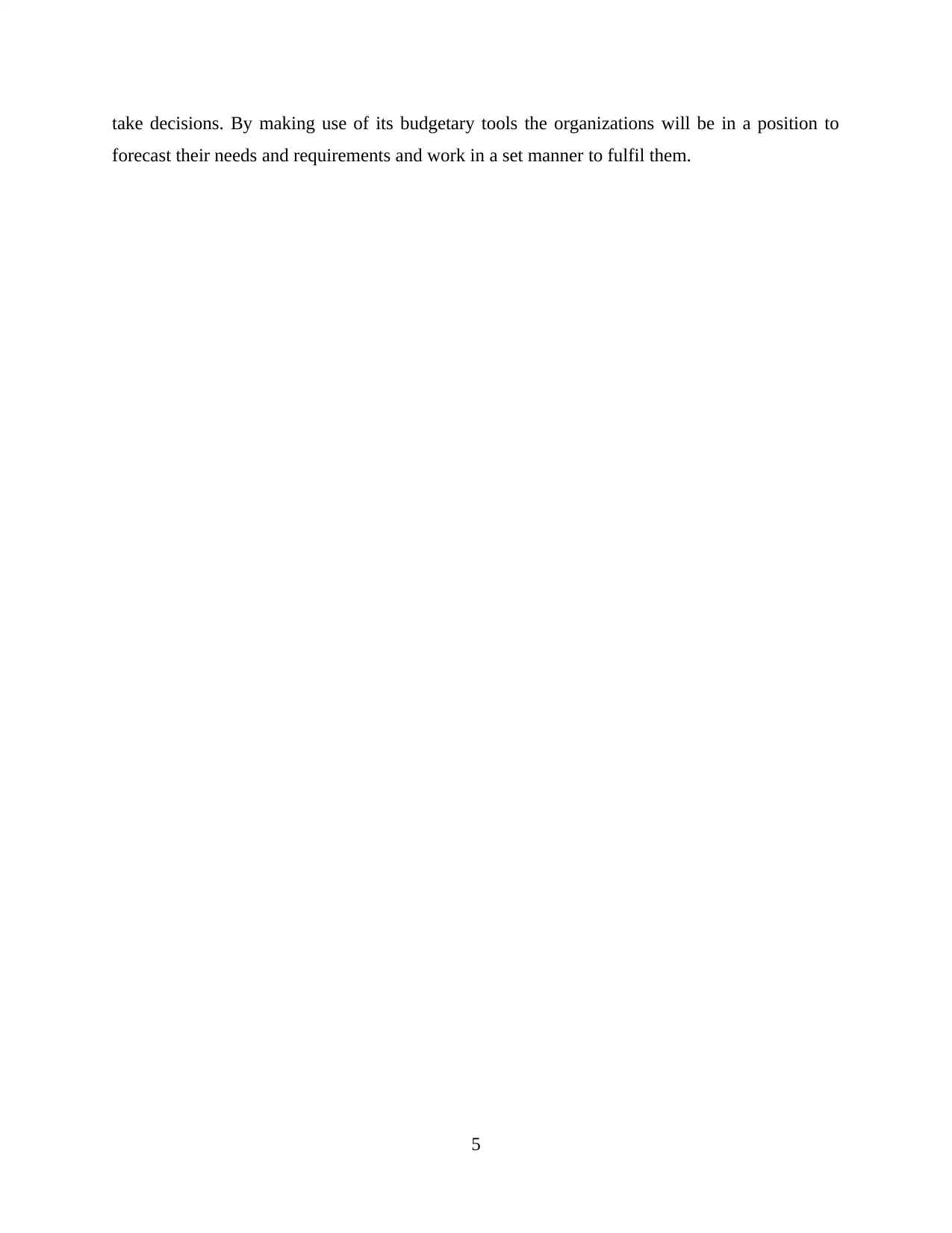
take decisions. By making use of its budgetary tools the organizations will be in a position to
forecast their needs and requirements and work in a set manner to fulfil them.
5
forecast their needs and requirements and work in a set manner to fulfil them.
5
Paraphrase This Document
Need a fresh take? Get an instant paraphrase of this document with our AI Paraphraser
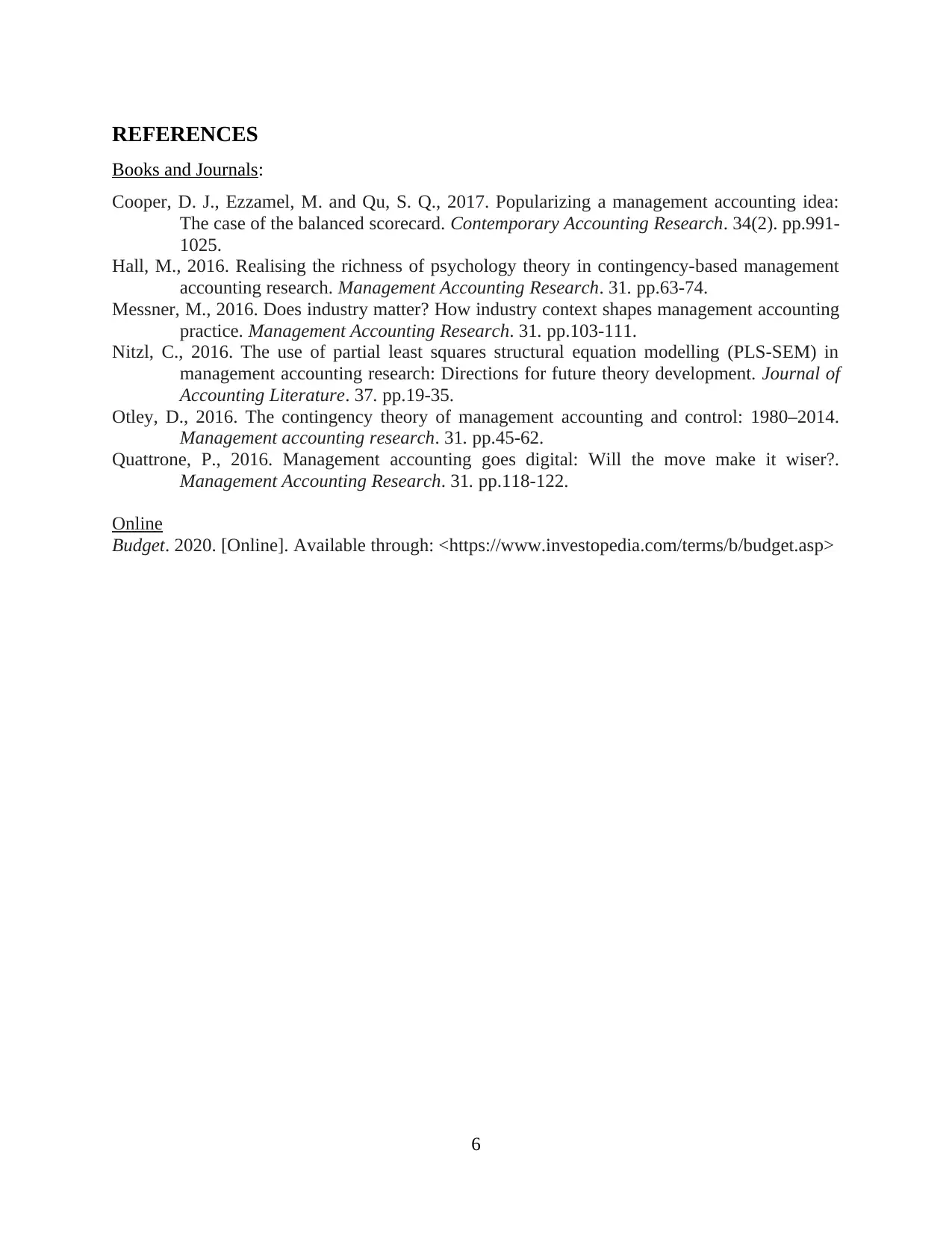
REFERENCES
Books and Journals:
Cooper, D. J., Ezzamel, M. and Qu, S. Q., 2017. Popularizing a management accounting idea:
The case of the balanced scorecard. Contemporary Accounting Research. 34(2). pp.991-
1025.
Hall, M., 2016. Realising the richness of psychology theory in contingency-based management
accounting research. Management Accounting Research. 31. pp.63-74.
Messner, M., 2016. Does industry matter? How industry context shapes management accounting
practice. Management Accounting Research. 31. pp.103-111.
Nitzl, C., 2016. The use of partial least squares structural equation modelling (PLS-SEM) in
management accounting research: Directions for future theory development. Journal of
Accounting Literature. 37. pp.19-35.
Otley, D., 2016. The contingency theory of management accounting and control: 1980–2014.
Management accounting research. 31. pp.45-62.
Quattrone, P., 2016. Management accounting goes digital: Will the move make it wiser?.
Management Accounting Research. 31. pp.118-122.
Online
Budget. 2020. [Online]. Available through: <https://www.investopedia.com/terms/b/budget.asp>
6
Books and Journals:
Cooper, D. J., Ezzamel, M. and Qu, S. Q., 2017. Popularizing a management accounting idea:
The case of the balanced scorecard. Contemporary Accounting Research. 34(2). pp.991-
1025.
Hall, M., 2016. Realising the richness of psychology theory in contingency-based management
accounting research. Management Accounting Research. 31. pp.63-74.
Messner, M., 2016. Does industry matter? How industry context shapes management accounting
practice. Management Accounting Research. 31. pp.103-111.
Nitzl, C., 2016. The use of partial least squares structural equation modelling (PLS-SEM) in
management accounting research: Directions for future theory development. Journal of
Accounting Literature. 37. pp.19-35.
Otley, D., 2016. The contingency theory of management accounting and control: 1980–2014.
Management accounting research. 31. pp.45-62.
Quattrone, P., 2016. Management accounting goes digital: Will the move make it wiser?.
Management Accounting Research. 31. pp.118-122.
Online
Budget. 2020. [Online]. Available through: <https://www.investopedia.com/terms/b/budget.asp>
6
1 out of 8
Related Documents
Your All-in-One AI-Powered Toolkit for Academic Success.
+13062052269
info@desklib.com
Available 24*7 on WhatsApp / Email
![[object Object]](/_next/static/media/star-bottom.7253800d.svg)
Unlock your academic potential
Copyright © 2020–2026 A2Z Services. All Rights Reserved. Developed and managed by ZUCOL.





